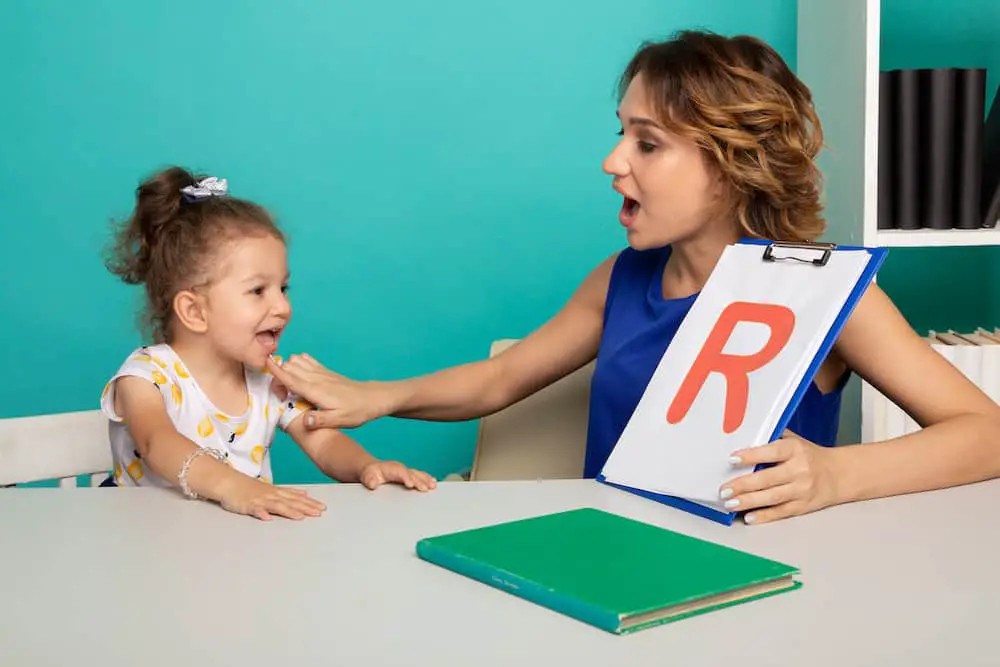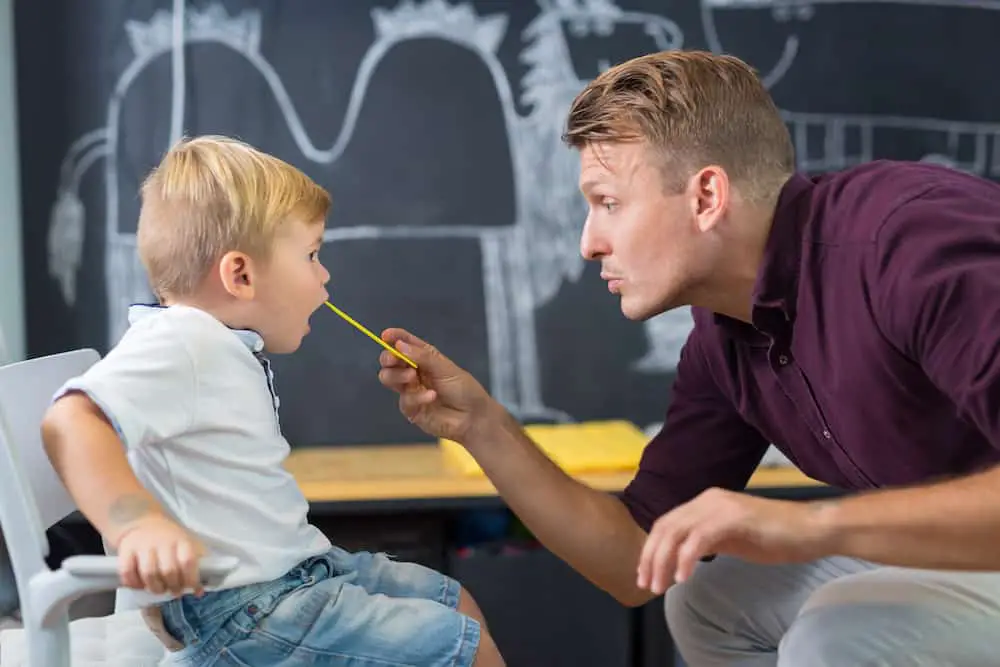With proper speech treatment, children with communication problems will benefit socially, intellectually, and emotionally.
One of the best techniques for tackling children’s speech disorders is speech therapy.
How effective is speech therapy for toddlers?
Let’s discuss the topics associated with the effectiveness of SLPs (speech-language pathologists) to our children.
Language Disorders in Toddlers
Infants and toddlers learn language by acquiring the communication skills of those around them.
They should be able to comprehend what others are saying before they can mimic the sounds and speak.
By the time they get into early school age, their communication skills are far beyond what they were from when they first started speaking.
Unfortunately, some children have language disorders that impede their language-related capabilities.
In fact, the National Institute on Deafness and Other Communication Disorders records that millions of children ages three to 17 have language-related disorders in the US.
Here are the two core language disorders that are common in toddlers:
Receptive Language Disorder
Individuals with a receptive language disorder struggle with words and concepts.
In other words, they don’t always understand what other people say.
Children with this type of disorder have difficulties understanding words, whether from speech or text.
Expressive Language Disorder
Toddlers with expressive language disorder find it challenging to speak actual words.
They either leave words outside of phrases, are confused with word order, or repeat sentences and phrases.
There’s also a condition wherein both disorders are evident in a child, called mixed receptive-expressive language disorder.
What Is Speech Therapy?
To learn how effective speech therapy is for toddlers, you will first want to familiarize yourself with its setup.
When a toddler undergoes a speech-language therapy program, an SLP will collaborate with your child in a variety of ways.
It could be either via one-by-one sessions, in small groups, or in a classroom setting.
It’s almost unheard of that SLPs will have the same strategy of treatment for every student.
Instead, treatment is tailored to cater to the needs of each child.
To enhance opportunities for speech-language improvements, SLP will use many techniques.
Benefits of Speech Therapy for Toddlers
Speech therapy covers methods and practices that strive to enhance overall communication.
This treatment is carried out by speech-language pathologists, who specialize in helping children with various disorders and delays.
Here’s how an SLP could be vital in your child’s overall language development:
Speech Fluency
Stuttering, also called dysfluency, is a speech disorder involving frequent and substantial difficulties with proper fluidity and speech flow.
Individuals who stutter may know the words but have trouble saying them.
For example, a word, phrase, consonant, or vowel sound can be repeated or prolonged.
In some cases, people with this disorder will pause while speaking because a word or sound is too complicated for them to say.
Speech therapy can help teach children techniques to minimize or remove behaviors.
You will find programs that focus on word repetitions, blocks, interjections, and prolongations.

Articulation
Articulation is the physical capacity to move various oral cavity parts, such as the tongue, lips, jaw, and palate, to generate distinct speech sounds.
These speech sounds are called phonemes.
For example, we inhale the “b” sound to articulate, and then turn on our voice, put our lips together, control the airflow, and release it by opening our lips.
Related to articulation is intelligibility, which is the comprehensibility of words and speech sounds.
If a child’s articulation skills are affected for whatever reason, their intelligibility will also take a hit.
Speech therapy can train children to generate the particular speech sounds or sound patterns they have difficulties with.
Once successful, children with improved intelligibility will be more confident in communicating with others.
Vocal Quality
Voice disorders pertain to vocal fold abnormalities that affect a person’s ability to have a voice.
These disorders include vocal cord paralysis, vocal fold nodules or polyps, and other diseases that may cause aphonia or hoarseness.
In early childhood, hoarseness is one of the frequent voice disorders, mainly due to vocal abuse.
Behaviors that trigger vocal abuse are screaming, prolonged speaking, coughing, clearing of the throat, and other similar voluntary actions.
Speech-language pathologists with expertise in voice and resonance disorder can work with children to reduce these behaviors and alleviate fold tension.
Expressive and Receptive Language Skills
Receptive language relates to the listening and linguistic abilities of a child.
Young children are generally stronger in receptive language skills (comprehension skills) than expressive language skills (speech capabilities).
An SLP can teach your kid new words and how to use them, answer questions, and engage in discussions.
As mentioned earlier, expressive language refers to the manner of speaking.
Speech therapy can help children learn and speak new words, say them, and apply them in phrases and sentences.
Pediatric Swallowing
In addition to speech and language, many speech-language pathologists are educated in pediatric swallowing and nutrition.
SLPs have a vast knowledge of the anatomy and functions of the different parts of the oral cavity.
As such, they are also skilled in tackling swallowing issues that could impact a child’s development.
Social Skills Development
Social skills refer to a person’s capacity to interact with others. Many diverse qualities are considered part of social skills.
These include understanding social rules, knowing and applying the correct body language, and using the appropriate words.
Empathy to perceive the world from the point of view of another is also considered a part of it.
Children with language disorders may also suffer from a lack of social skills.
SLPs can help toddlers develop such qualities, which will also contribute to their improvement in communication.
Confidence Boost
Many children with speech development problems may develop issues with self-esteem, trust, sensitivity, and, in more serious cases, anxiety.
These problems might make it harder for them to learn to communicate with people at an early age.
If social anxiety difficulties continue, they might negatively impact your kid’s confidence at school or in other social settings.
SLPs can help kids learn how to resolve these issues and communicate comfortably with others.
It will also be conducive to their academics and after-school activities.
With the help of SLPs, they could considerably be more confident in communicating and articulating their views, questions, and opinions.
Challenges of Speech Therapy
Like in every treatment, speech therapy has its own set of challenges that could deter parents.
Regardless of the technique, speech therapy requires significant time not only for the child but also for the parents.
Even when the session is complete, some lessons are expected to be carried out at home.
Given the obligation, it might cause stress, fatigue, and anxiety for the whole family to comply.
In addition to time, parents might get frustrated when the treatment is not proceeding as expected.
That’s why it is vital to have realistic expectations with the SLP in designing a speech therapy program.
How Effective Is Speech Therapy for Toddlers?
There’s a study made by the National Library of Medicine several years ago.
According to their findings, speech therapy treatment significantly boosted children’s language development against those with no treatment.
Improvement in three diagnostic categories (comprehension, speech, and expression) is effective over a six-month period.
It’s important to note that the children spent six hours of treatment regularly during those six months before the study concluded their findings.
The most important thing is to work in close cooperation with your child’s SLP.
Always ask the right questions, take notes, and help with the homework.
Teamwork could fully unlock your child’s communication development faster than expected.
Conclusion
By now, we have determined how effective is speech therapy for toddlers.
The speech-language pathologist will probably spend an hour or two with your child every week.
For the remainder of the week, you and everyone in your household are the ones interacting with your child.
These daily interactions will play a significant factor in your child’s development.
With proper information and patience, you could be the finest speech therapist your child will ever have.

